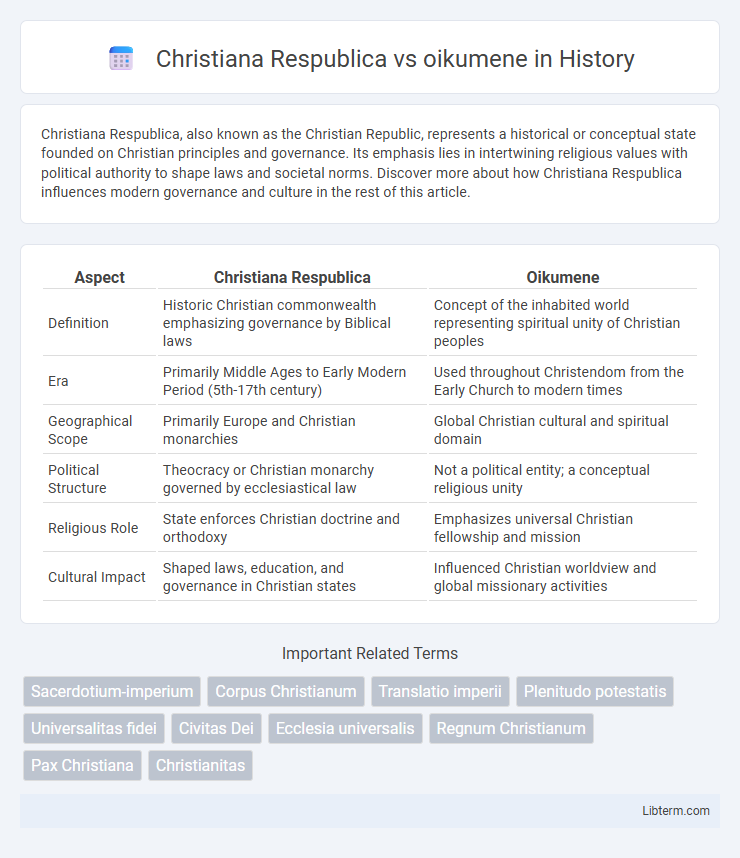Christiana Respublica, also known as the Christian Republic, represents a historical or conceptual state founded on Christian principles and governance. Its emphasis lies in intertwining religious values with political authority to shape laws and societal norms. Discover more about how Christiana Respublica influences modern governance and culture in the rest of this article.
Table of Comparison
| Aspect | Christiana Respublica | Oikumene |
|---|---|---|
| Definition | Historic Christian commonwealth emphasizing governance by Biblical laws | Concept of the inhabited world representing spiritual unity of Christian peoples |
| Era | Primarily Middle Ages to Early Modern Period (5th-17th century) | Used throughout Christendom from the Early Church to modern times |
| Geographical Scope | Primarily Europe and Christian monarchies | Global Christian cultural and spiritual domain |
| Political Structure | Theocracy or Christian monarchy governed by ecclesiastical law | Not a political entity; a conceptual religious unity |
| Religious Role | State enforces Christian doctrine and orthodoxy | Emphasizes universal Christian fellowship and mission |
| Cultural Impact | Shaped laws, education, and governance in Christian states | Influenced Christian worldview and global missionary activities |
Defining Christiana Respublica: Origins and Meaning
Christiana Respublica refers to the concept of a Christian commonwealth rooted in early Christian political thought, emphasizing a society governed by Christian principles and communal values. Its origins trace back to the medieval period, particularly influenced by the writings of Augustine of Hippo and later Reformation thinkers who envisioned a political body united by faith and moral law. This idea contrasts with the oikumene, representing the entire inhabited world, by focusing on a distinct Christian polity that shapes social and political order.
Understanding Oikumene: Historical Context
Oikumene, derived from the Ancient Greek word oikoumene meaning "the inhabited world," refers historically to the known civilized world during the Hellenistic and Roman periods, encompassing territories under Greco-Roman influence. In contrast, Christiana Respublica denotes the Christian commonwealth or the collective body of Christian states that emerged in medieval Europe, shaping political and religious unity through the concept of Christendom. Understanding Oikumene's historical context reveals its evolution from a geographic and cultural term to a foundational idea influencing the development of Christiana Respublica, where the spiritual governance of Christendom sought to transcend earthly boundaries defined by the oikumene.
Key Differences Between Christiana Respublica and Oikumene
Christiana Respublica emphasizes a theocratic governance model rooted in Christian doctrine, prioritizing ecclesiastical authority and communal religious observance, whereas Oikumene advocates for a pluralistic and secular approach to governance, promoting inclusivity and diverse cultural representation. Christiana Respublica enforces strict moral codes derived from scripture, contrasting with Oikumene's flexible legal framework that accommodates varying ethical perspectives. Economic policies in Christiana Respublica are often intertwined with religious mandates, while Oikumene supports market-driven strategies that encourage innovation and economic pluralism.
Theological Foundations of Christiana Respublica
Christiana Respublica is grounded in the theological foundations of classical Christian doctrine, emphasizing the sovereignty of God over the political and social order. Its framework upholds the integration of Scripture as the ultimate authority, guiding laws and governance to reflect divine justice and moral order. This theocratic vision contrasts with the oikumene approach, which promotes a more pluralistic and secular worldview, often prioritizing human reason over revealed theology.
Oikumene and the Universal Church Concept
The concept of Oikumene, rooted in the Greek term for "the inhabited world," represents the vision of a universal church transcending national and cultural boundaries, aiming for a unified Christian community under one ecclesiastical authority. This universal church concept emphasizes inclusivity and spiritual unity, contrasting with the Christiana Respublica model that organizes Christianity within distinct political and territorial frameworks. Oikumene challenges parochial structures by advocating for a global ecclesial identity that fosters theological coherence and collective mission across diverse Christian traditions.
Medieval Europe: Christiana Respublica in Action
Christiana Respublica in Medieval Europe shaped governance by integrating Christian principles into political and legal frameworks, emphasizing moral responsibility and divine justice. The oikumene, representing the known inhabited world, provided the geographical and cultural context in which the Christiana Respublica extended its influence through missionary work, diplomacy, and legal codification. Monastic institutions and ecclesiastical courts played crucial roles in implementing the Christiana Respublica's vision, fostering unity and stability within diverse medieval European territories.
Ecumenism and Evolution of Oikumene
Christiana Respublica represents a Christian political ideal rooted in the concept of a divine commonwealth, whereas oikumene refers to the inhabited world, evolving into a framework of global cultural and religious interconnectedness. Ecumenism, as a movement within Christiana Respublica, seeks to unify diverse Christian denominations to reflect a unified spiritual commonwealth, promoting dialogue and cooperation. The evolution of oikumene reflects expanding notions of unity beyond geographical and cultural boundaries, fostering inclusive interfaith engagement and global religious pluralism.
Political Implications: Church and State Relations
Christiana Respublica and the concept of oikumene represent contrasting models of church and state relations, influencing political structures and governance. Christiana Respublica emphasizes a theocratic or confessional state where church authority guides political decisions, reinforcing moral and social order through ecclesiastical oversight. In contrast, oikumene promotes a more inclusive and pluralistic approach, advocating for the separation of religious and political spheres to accommodate diverse beliefs within a unified civil polity.
Modern Perspectives on Christiana Respublica vs Oikumene
Modern perspectives on Christiana Respublica versus Oikumene emphasize the evolving relationship between distinct Christian nations and the broader global Christian community. Scholars analyze the tension between maintaining national religious identity and embracing ecumenical unity amidst globalization and cultural pluralism. This debate addresses how Christiana Respublica can coexist with Oikumene principles while fostering dialogue, inclusivity, and collaborative faith initiatives worldwide.
Lasting Legacy and Contemporary Debates
Christiana Respublica established enduring principles of religious liberty and communal governance that continue to influence modern legal and ethical frameworks worldwide. Its legacy persists in contemporary debates surrounding the balance between individual freedoms and collective societal responsibilities within pluralistic societies. Scholars and policymakers frequently reference its foundational values when addressing challenges of multicultural integration and religious coexistence today.
Christiana Respublica Infographic

 libterm.com
libterm.com